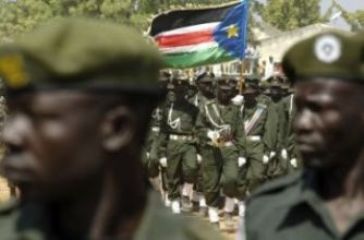South Sudan army rejects Human Right report
July 3, 2010 (ALEK) – An official spokesman of the Southern Sudan army, the Sudan People’s Liberation Army (SPLA) has rejected a human rights report of abuses committed by the army during the April elections.

On Wednesday, the Human Rights Watch group released a report urging both regional and the national authorities to investigate human rights abuses connected to its April 2010 elections and bring to justice those responsible. “Addressing the abuses is especially important as the country prepares for a referendum on a widely speculated possible self-determination of Southern Sudan,” the report says.
The 32-page report, dedicated to April polls, documents numerous rights violations across Sudan by both northern and southern authorities in the period leading up to, during, and following the April elections. These abuses include restrictions on freedom of speech and assembly, and widespread intimidation, arbitrary arrests, and physical violence against monitors and opponents of the incumbent parties by Sudanese security forces across the country.
The report is based on research carried out between November 2009 and April 2010 in Khartoum and Southern Sudan.
In April 2010, Sudan conducted first multiparty elections after 24 years of successive military takeovers, during which the country experienced rigor and undemocratic governance.
Although ordinary citizens had hoped that elections were an important milestone of the 2005 peace agreement, which was meant to pave the way forward for Sudan, experiences during period leading to the race suggest the contrary, hence prompted Human Rights Watch to release a report emphasizing that pushing the elections-related abuses under the rug would not bode well for the upcoming referendum in January next year.
The 2005 Comprehensive Peace Agreement, which ended 21 years of civil war between northern and southern forces, called for Sudan to hold national elections and a referendum on southern self-determination. Southern Sudanese, including millions of southerners living in Khartoum and northern states, will decide in the January 2011 vote whether to secede from the north or remain part of united Sudan.
Human Rights Watch further called on the national unity government to enact genuine reforms called for in the peace agreement, including improvements to the national security apparatus. The national security law currently grants broad powers of search, seizure, and arrest, and allows for detention without judicial review for up to four and a half months, in violation of international law.
Human Rights Watch found that in the months leading up to the April elections the two ruling parties both in the south and north in reference to National Congress Party (NCP) and Sudan People’s Liberation Movement (SPLM) suppressed peaceful assembly by opposition party members and prevented free association and speech.
During election week in the north, there were fewer cases of such restrictions, but several cases of harassment, intimidation, and arrest of opposition members and elections observers. In Southern Sudan, Human Rights Watch documented widespread intimidation, arbitrary arrest, detention, and mistreatment of opponents of the southern ruling Sudan People’s Liberation Movement (SPLM), as well as of election observers and voters, throughout the elections process in several southern states.
In addition to these rights violations, serious irregularities in the conduct of the election – such as multiple voting, ballot-stuffing, and other acts of fraud – undermined their legitimacy. On April 26, the elections commission declared both ruling parties the winners in their regions following the vote-counting.
However, General Kuol disputed participation of the Sudan People’s Liberation Army during elections, in favor of one political party as widely reported by some media outlets in the country, following release of the human rights owned report. “Our forces never participated in the elections in favor of one political party,” he said.
“There is no evidence to substantiate these allegations. This report being used by some media to advance their propaganda against SPLA has fallen short of truth for it is largely filled with allegations aimed at tarnishing image of the SPLA…,” said General Kuol.
Kuol, who is one of the first regional officials in uniform to voice his disappointment, however, acknowledged arrest of SPLA soldiers and officers accused to have acted in favor of some political figures during elections.
“There is nowhere we have reports suggesting direct participation of our officers and soldiers let alone arrest of politicians and their supporters. What I can remember is that in Northern Bahr el Ghazal state, for instance, we arrested only soldiers and officers whose presence in the area during elections became advantage to some politicians. They were arrested because they were violating some military codes and ethnics in line with interim constitution of southern Sudan,” he acknowledged.
“I repeat. We did not arrest any political figure and members of their political grouping,” he added, stressing that this report has published one side of the story.
The Human Rights Watch should have conducted cross-check with series and thorough investigation to verify these claims prior to publication, he said, adding he challenged those using it against SPLA to produce linking participation of the army to the report.
“I challenge them to produce evidence involving our participation. This report must be perused. It has nothing particular about SPLA but rather to the two parties,” Kuol said, referring to the NCP and the SPLM and not their military wings, the Sudan Armed Forces (SAF) and the SPLA.
(ST)

James Okuk Solomon
South Sudan army rejects Human Right report
The Abyei’s SPLA spokesman has become a kingpin of lies and denials in the South. But his time is arriving because his lies and denials of realities shall burry him soon. Shame on him! Let him leave the South and go back to Abyei in the North or to Khartoum like his brother Luka Biong where their grandfathers sold their birthrights to the Arabs.